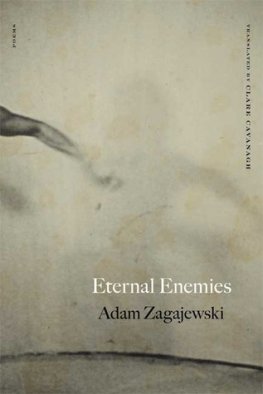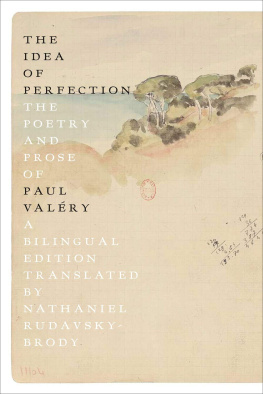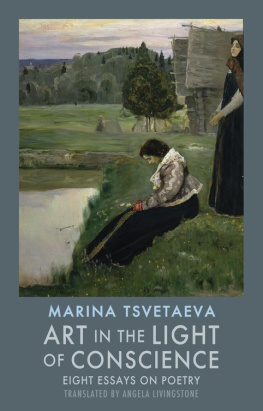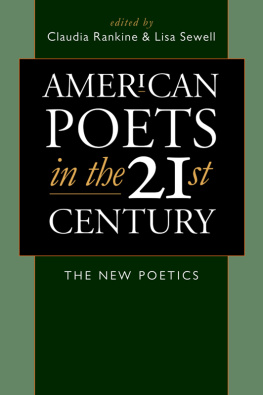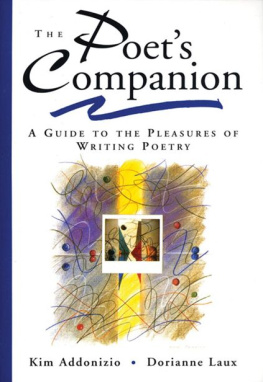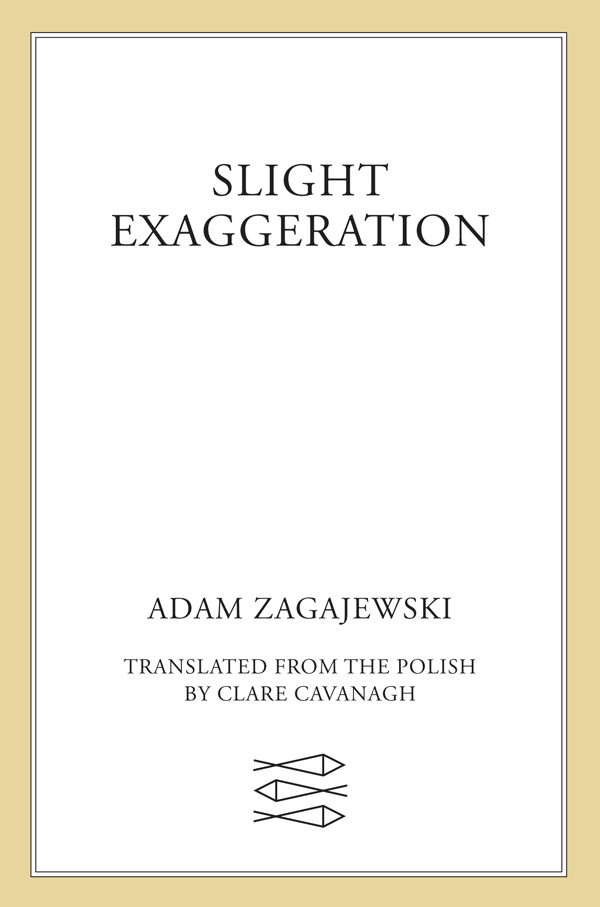Contents
Guide

The author and publisher have provided this e-book to you for your personal use only. You may not make this e-book publicly available in any way. Copyright infringement is against the law. If you believe the copy of this e-book you are reading infringes on the authors copyright, please notify the publisher at: us.macmillanusa.com/piracy.
I wont tell all regardless. Since nothing much is happening anyway. I represent, moreover, the Eastern European school of discretion; we dont discuss divorces, we dont acknowledge depressions. Life proceeds peacefully around me, a gray and exceptionally warm December outside my window. A few concerts. A gifted young singer performed in the Lawyers Club. Yesterday we went to a beautiful concert of Shostakovichs music (they also played the string quartet, Au-del dune absence , that his biographer Krzysztof Meyer composed and dedicated to him). I heard another piece for the first time, the Vocal-Instrumental Suite for Soprano, Violin, Cello, and Piano, op. 27, set to seven poems by Alexander Blok. Students from the Music Academy played: brimming with enthusiasm, technically marvelous. The final work, that suite, made a tremendous impression on M. and me. The concert marked the hundredth anniversary of Shostakovichs birth and so had a special charge, an extra jolt. The students lit candles on the stage and used just a few spotlights. They achieved an extraordinary kind of concentration. Its often like that when you hear young performers, still unspoiled by routine, by careers, young musicians playing joyfully, with their whole body, their whole soul.
* * *
The sense of joy nearly every time I find myself on Krakows main square. In every season, at every time of day, I admire the spaces majesty, the odd, cubistically arranged structures, symmetry and asymmetry conjoined, the airy Italian Cloth Hall set alongside the Marian Cathedrals Gothic gravity, like gigantic building blocks.
* * *
Im reading about Gottfried Benn in Poetry magazine. Warsaws World Literature just published a hefty selection of his poems, letters, and essays in a thick issue dedicated to Benn and Brecht. Both died in 1956, and the iron law of anniversaries unites them posthumously, fifty years after their deathstwo poets who have absolutely nothing else in common. Benn began to mock the application of Marxist theory to literature early on. His scornful attitude set him apart in leftist, literary Berlin, in the years before Hitler seized power: the unyielding aesthete amid the doctrinaire improvers of humanity I go back to Benns poems every so often, and they almost always electrify me (Jena vor uns im lieblichen Tale); so do bits of his essays and virtually all his letters to Mr. Oelze, the businessman from Bremen. The letters are offhanded, a bit cynical at times, now and then a moment of pure poetry gleams. A petit bourgeois par excellence, Benn led the modest life of a craftsman (although, as we know, he was a doctor, a dermatologist, but he never earned much). In Oelzewhom he idealized, glorified, endowed with a higher social rank than he in fact possessedhe found an audience for his own ideas, observations, provocations, and projects.
* * *
Ive been reading Karl Corinos thick biography of Robert Musil. Musil wrote a beautiful speech when Rilke diedhe was among those who recognized the poets greatness early on. I also found a description of the tragicomic talk Musil gave at the Congress for the Defense of Culture in Paris in June 1935. He had no idea that the Congress had been organized by the Communists, and thus only Hitlers system was open to criticism: the Soviet Union was off-limits. But Musil defended the artists individualism and warned against the collectivism emerging in various European nations. He insisted, too, that there was no connection between culture and politics, that cultures very existence depends upon some delicate, capricious, unpredictable element, hence even a decent political system wont automatically produce great art. Some participants at that famous Congress even booed him; theyd been expecting propagandistic pronouncements, not considered, objective reflections. Corino also writes a great deal about Musils poverty; he even considered suicide in the thirties, when he couldnt foresee any financial possibilities for him and his wife. Both the Nazis and the Communists attacked himthe very title of his great novel, The Man Without Qualities , must have angered them equally. After all, they labored to create a new man with sharply defined qualities. For both groups, he represented a bourgeois epoch in decline. (But of course that bourgeois epoch didnt declineor perhaps it declined and then recovered.) Musil spent the last years of his life in exile in Switzerland, where he lived even more modestly, in poverty and isolation. Thomas Mann was an important figure to him; he felt both love and hate, Hassliebe , as the Germans say, for the great writer. Everything turned out for Mann: even emigration wasnt a disaster. Those who knew Musil described the nervous trembling that overcame him whenever he heard the name Mann mentioned in conversation. Musils perfect description of The Magic Mountain : the novel resembles a sharks stomach. Manns great novel contains, he meant, undigested fragments of existing European systems of thought, ideologies, and so on. Whereas The Man Without Qualities operates on an entirely different principle; all the references to political and philosophical reality have an intermediate character, theyre mystical, allusive. Musil was captivated by der Mglichkeitssinn , the sense of possibility, by whatever happens exclusively in the conditional. The question remains: maybe, from this point of view, Mann was right to toss thick chunks of actual ideas into The Magic Mountain .
* * *
In Poland, Christmas is the most deeply, consistently familial of holidays. Everyone celebrates at home. Christmas Eve is the pivotal moment. Houses and apartments become bastions of family egotism, family love, if you will. Lone souls must suffer all kinds of tortures if nobody from one family or another thinks to invite them You cant count on restaurants, theyre closed. This year Christmas Eve came on Sunday; by morning the streets were silent. On Thursday and Friday I saw dozens of students heading off to the railroad station with their backpacks and bags; Krakow empties out. By 7:00 p.m., the city is a ghost town. The Main Square, which throngs with people every other day (and even night), was dark, deserted, as in the war. M. and I went for a walk, we strolled through the square, we couldnt get over the eerie silence, darkness, emptiness. The countless restaurants in every storefront of the square wereall!shut, unlit. We noticed only one spot on the squares expanse where some enterprising type had set up shop, suspecting that hungry, thirsty people might still turn up. In an improvised wooden shed three cooks fried sausages and chops and reheated cabbage and potatoes. This single warm and well-lit spot drew all the tourists, who certainly couldnt understand why the normally welcoming restaurants had all closed shop. Why the churches were shut (and would reopen their doors only after midnight mass). They didnt know that priests, too, were sitting down to dinners including at least twelve courses, that borscht steamed on the tabletops. Japanese, Italian, French, and American tourists lined up for their humble sausages. We sat for a moment at one of the improvised tables, it wasnt too cold. The tourists alongside us inhaled the scent of cooked meat steaming up from plastic plates. Honey-colored drops of mustard on white trays. An oasis. It was a caricature of Bethlehem, that well-lit place beneath its wooden roof. I told M. I could imagine a play that might capture something of that moment. The silent city and tourists hushed talk. So write it. But I cant.


